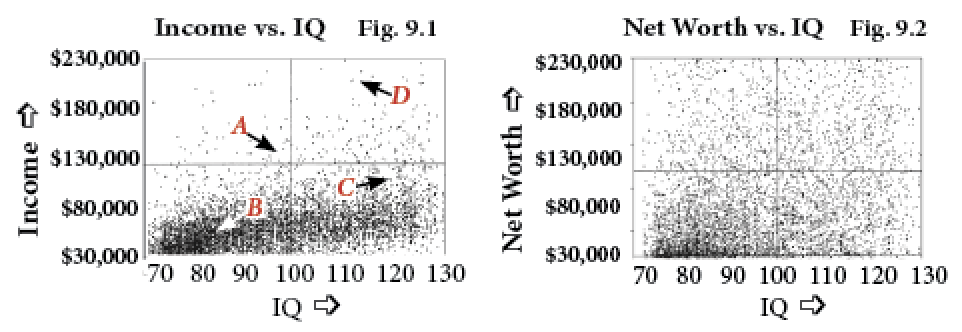In my upcoming book titled, Intelligence, IQ, and Perception: Unpopular Truths Exploding Popular Myths, I devote a chapter to the question, “Are Smarter People Wealthier?” An excerpt is included below:
In a research paper published in 2007, titled Do you have to be smart to be rich? The impact of IQ on wealth, income and financial distress, psychologist J. L. Zagorsky displayed the graphs in figures 9.1 and 9.2 (without the labelled points A, B, C, and D).

Figure 9.1 is a scatter plot of the ordered pairs (IQ, annual income) for 7403 baby boomers randomly sampled in 2004. They are included to provide an example of a person in each quadrant.
• Point A represents a person of IQ 98 and an income of $141,000.
• Point B represents a person of IQ 85 and an income of $55,000.
• Point C represents a person of IQ 118 and an income of $120,000.
• Point D represents a person of IQ 112 and an income of $205,000.
Half of the people have IQ below 100 and they are located in the quadrants where points A and B are located. We see the highest density of points in the quadrant where B is located, and most of them are crowded below the $50,000 income line. These points represent people of lower than average IQ who have relatively low income.
The quadrant where C is located contains the people who have higher than average IQ, but earn less than $130,000 per year. The plot shows that there were a lot of people of high IQ earning less than $80,000 in 2004. The quadrant where D is located contains the people who have higher than average IQ and earned more than $130,000 in 2004. The university professors at the prestigious universities are in this quadrant as are many professionals, corporate managers and entrepreneurs.
If there were a strong positive correlation between IQ and income, almost all the points would cluster tightly along a line traveling upward from left to right. However, we see that there are many points quite distant from the main cluster. This means that the correlation between IQ and income is weak. In fact, it is just below 0.3, the criterion for a moderate correlation.
Figure 9.2 reveals that there is virtually no correlation between IQ and wealth. Except for the cluster corresponding to low IQ and low income, the points appear to be almost randomly distributed. Knowing that a person has an IQ of 120, won’t tell you much about her accumulated wealth. Psychologist Jay Zagorski computed the correlation between IQ and wealth to be about 0.16, suggesting that the two variables are only remotely connected. He reports: ( Zagorski, Jay, L. 2007. “Do you have to be smart to be rich? The impact of IQ on wealth, income and financial distress.” Intelligence, 35 p. 500.)
The title [of this paper] asks, “Do you have to be smart to be rich?” If IQ test scores are an accurate measure of intelligence and if intelligence is relatively fixed from teen years to adulthood, then the results indicate the answer is no…individuals with low intelligence should not believe they are handicapped in achieving financial success, nor should high intelligence people believe they have an advantage.
In a meta-analysis of the relationship between intelligence and socioeconomic success, psychologist Tarmo Strenze surveyed a wide range of research papers dealing with the relationship between these two variables. His study yielded estimates of the correlation between IQ and income that ranged between 0.15 and 0.27. He reports: (Strenze, Tarmo. 2007. “Intelligence and Socioeconomic Success: A Meta-analytic Review of Longitudinal Research”. Intelligence. 35 (5): 415.) https://emilkirkegaard.dk/en/wp-content/uploads/Intelligence-and-socioeconomic-success-A-meta-analytic-review-of-longitudinal-research.pdf
The correlation of [IQ] with income is 0.20 considerably lower [than the correlation with job performance], perhaps even disappointingly low, being about the average of the previous meta-analytic estimates (0.15 by Bowles at al., 2001; and 0.27 by Ng et al., 2005).
According to Cohen’s classification scheme (an accepted standard in the social sciences) a positive correlation below 0.30 is considered weak, a correlation between 0.30 and 0.50 is considered moderate, and over 0.50 is considered strong.
The research seems to indicate that, contrary to widely-held belief, there is a weak correlation between IQ and income and almost no correlation between IQ and wealth.
The taunt, “If you’re so damn smart, why ain’t you rich,” is based on the assumption that those of high IQ are sufficiently interested in accumulating wealth to make the necessary effort. As seen in the examples above, many intellectually gifted people are marching to the tune of a different drummer. They are driven to gain self-fulfillment through the exercise of their special talents and derive fulfilment from their creative endeavors–accumulating wealth is not their goal.
